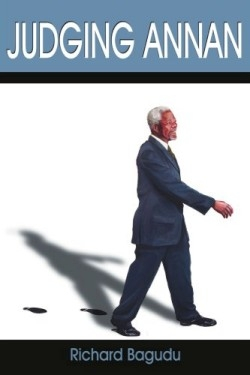Judging Annan
We have the means and the capacity to deal with our problems if only we can find the political will. — Kofi Annan
With a Nobel Peace Prize and an impressive list of diplomatic accomplishments the seventh Secretary-General of the United Nations’ position in history should be unassailable. But the man has vocal critics. Rightly or wrongly his reputation was singed by two headline-dominating crises that occurred under his aegis: the UN-Iraq Oil-for-Food scandal and the possibly preventable 1994 Rwandan genocide. Using primary documents and personal interviews Richard Bagudu delves deep into the workings of the UN to assess Annan’s performance accomplishments and culpability. The fatally flawed Security Council hamstrung by the permanent members’ undemocratic veto power emerges as a sporadic but powerful villain.
The tragedy of 800000 ethnic Tutsis murdered while the UN’s on-site commander of peacekeeping begged Annan for permission to intercede is the problem that cannot be fully explained away. Still smarting from a fresh failure in Somalia American and British governments withheld troops equipment and their blessings while France provided weapons to the Hutu militia. President Bill Clinton has since cited inaction in Rwanda as his largest regret. There’s blame to go around but Annan’s concerns regarding regulations and the maintenance of neutrality were pretty expensive. How bad was it? “Vultures were overwhelmed. They uncharacteristically walked past carcasses without a peck.” Recent atrocities in Darfur indicate that something is still broken.
The journalistic presentation originates from a certain point of view but respect for truth doesn’t allow room for skewed facts. Annan’s minor blunders are acknowledged. Appendices including copies of once-classified United States government papers bolster the author’s statements. A series of Leno-esque man-on-the-street anecdotes provide comic relief as folks ignorant of current events demonstrate they don’t need any actual information to form strong opinions. Although racism has not yet been eradicated the author’s assertion that a white or non-African UN leader would have largely escaped political attacks is not convincing. As he inadvertently points out Dag Hammarskj&246;ld a Swede who served as the second Secretary-General was also unjustly vilified by partisan nationalists during his tenure.
Richard Bagudu practices Immigration law in Maryland. He was educated in New Hampshire and Nigeria where he served as editor-in-chief for The Lawyer’s Digest. Judging Annan succeeds at addressing allegations leveled in the court of public opinion. The details partially exonerate Annan especially in the case of Oil-for-Food where his fault probably doesn’t extend further than being at the helm while others were engineering financial irregularities. This is fine reading for anyone interested in international politics.
Disclosure: This article is not an endorsement, but a review. The publisher of this book provided free copies of the book and paid a small fee to have their book reviewed by a professional reviewer. Foreword Reviews and Clarion Reviews make no guarantee that the publisher will receive a positive review. Foreword Magazine, Inc. is disclosing this in accordance with the Federal Trade Commission’s 16 CFR, Part 255.

